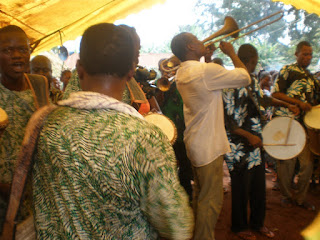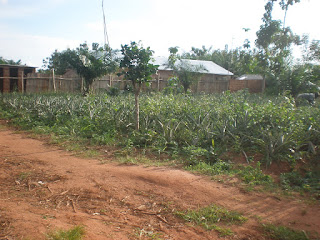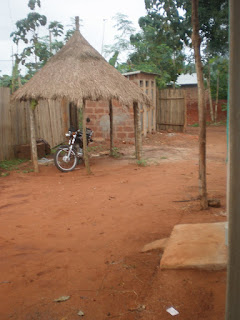The more time I spend with people, the more our conversations break the “How’d you sleep? How’s your health? How are the kids?” framework. Everyone has a story. Certainly everyone in the US has a story, but its generally a variation in frequency or degree of the same: divorce and remarriage, loans or debt, cancer or heart attacks, eating disorders, etc. Here the ingredients are more like polygamy, malaria, poverty, malnutrition, lack of health care, lack of education, etc. I’ve been fortunate (or unfortunate) enough to hear many stories. You learn more about the people, the lifestyle, the struggles, but it doesn’t make for easy sleeping at night.
My favorite topic is voodoo because people get so animated. It’s considered more of a culture than a religion, though many say they ‘leave God at the door’ when entering a voodoo ceremony (they also do this for abortions). Everyone has a story about a spell put on them or their friend, what they had to do to break it.
I recently learned that if a woman does not have any male children, and her husband dies while she is still relatively young (not that uncommon), she is evicted from the house by her late husband’s family. Property rights go to men alone. Also, I learned that in some cases of polygamous households, the first wife will actually go looking for a second wife for her husband. The mentality is if you know he’s going to get one eventually, it might as well be someone you get along with.
Some of the funniest conversations I’ve had about life in America include topics such as plastic surgery, liposuction, life expectancy, Michael Jackson, divorce, dieting, and greek life.
Random: I saw my first nomad last week. It was maybe the coolest thing I’ve ever seen/will ever see in my life. It was a man and a little boy-dressed in rags, skin incredibly black from the constant sun exposure- and about a dozen cows. They had travelled down from the North since the South has greener pastures this time of year. This is especially cool for me because I spent much of my last year of college studying conflicts between nomads and pastoralists in sub Saharan Africa (my senior thesis was on climate change conflicts in SSA). And as part of my job right now I’m asking village chiefs what their environmental problems are, and a couple have brought up nomads taking up decreasing amounts of land and resources. Unfortunately I think my thesis conclusion was something like “can’t we all just get along?” so I actually have no solution to offer.
Saturday, November 21, 2009
Lost Boys
There exists in Africa a concept of the lost. I first heard it called this in Obamas book Dreams From My Father, though it is a concept most have seen under other names or contexts. It refers to those individuals who have had the opportunity to travel to the developed world, mostly to attend university, and end up staying. Africa is much too far for the occasional visit, less in physical distance than in the distance referred to when we say “worlds away.” You are forced to choose. I suspect that its not that they purposefully forgot about their roots, never tried to come back, but more that, upon returning, they were welcomed with both open arms and outstretched hands. Expectations, many PCVs understand, can easily envelop and consume you. Obama also talks about racially mixed individuals as belonging to two worlds and thus, ultimately, none. Maybe its similar to that- you will always be identified with the other. When people talk about lost individuals, its usually with a mix of envy and disdain. Its funny- you hear about Indians and Chinese who are educated in the US and, increasingly, return to their native country to practice the profession for which they have been educated in a US university. Their return is often discussed negatively in the press, as though they have taken from some finite pot of knowledge and stolen away with it, ripping us off. But it is just these people who can be the most effective investment in development: they understand the people and the system, and have the education and skills that a great many don’t. I think one “returner” is probably worth thousands in development aid.
It is rare to meet returners in a rural setting. The career opportunities, the foreign development workers (as well as the running water and supermarkets) are only in the cities. I recently met a family of returners who started an NGO here that creates community gardens to supplement diets and incomes. The mechanics of it may not interest you, so I wont go into detail, but its closed cycle process is a thing of beauty. Though they don’t turn anyone down who wants to help out, it is intended for women and youth- women because income generation is crucial to both the gender equality movement here and the precarious situations of women, especially those who don’t bear sons and are thus not entitled to any of their husbands property, and youth in order to both educate the next generation in healthy lifestyles and to “keep kids off the street.” (I use street lightly.) They are a bizarre family for Benin. They dismiss criticisms of the small number of wives and children they have as ignorance, a hard feat considering that many still consider the number of wives you have determines the weight your word carries, the respect you command. Perhaps most inspiringly, they don’t take credit for any of it. They attribute their gender and social equity views to their grandfather, and their environmental and health work to the Peace Corps volunteer they housed 20 years ago, who kept a small garden on their property. These people embody Kennedys message of ask not what your country can do for you, but what you can do for you country.
Note to readers: I do know the appropriate use of apostrophes and the two forms of its. I just cant find the apostrophe on this God forsaken keyboard.
It is rare to meet returners in a rural setting. The career opportunities, the foreign development workers (as well as the running water and supermarkets) are only in the cities. I recently met a family of returners who started an NGO here that creates community gardens to supplement diets and incomes. The mechanics of it may not interest you, so I wont go into detail, but its closed cycle process is a thing of beauty. Though they don’t turn anyone down who wants to help out, it is intended for women and youth- women because income generation is crucial to both the gender equality movement here and the precarious situations of women, especially those who don’t bear sons and are thus not entitled to any of their husbands property, and youth in order to both educate the next generation in healthy lifestyles and to “keep kids off the street.” (I use street lightly.) They are a bizarre family for Benin. They dismiss criticisms of the small number of wives and children they have as ignorance, a hard feat considering that many still consider the number of wives you have determines the weight your word carries, the respect you command. Perhaps most inspiringly, they don’t take credit for any of it. They attribute their gender and social equity views to their grandfather, and their environmental and health work to the Peace Corps volunteer they housed 20 years ago, who kept a small garden on their property. These people embody Kennedys message of ask not what your country can do for you, but what you can do for you country.
Note to readers: I do know the appropriate use of apostrophes and the two forms of its. I just cant find the apostrophe on this God forsaken keyboard.
Tuesday, November 3, 2009
Brown Paper Packages Tied Up With Bows
When the dog (mosquito) bites, when the (massive African) bee stings, when I'm feeling blue...
A few of my favorite things:
-My morning coffee and crossword
-Calls from America, from anyone, but dad calls the most
-Rain pouring down on my rin toof
-Letters!
-Having my neighbor kill the lizards that get stuck in my backyard (the part I like is not having to do it myself)
-Daily to do lists with tasks in multiples of 5 (the habit will never change, but the tasks are radically different)
-Moto and bike rides on paths barely big enough for two feet
-Pregnant goats. They're midget goats so when they are pregnant they are bigger horizontally than vertically. Looks like they swallowed a chess board. Gets me every time.
-Having people say "welcome" instead of "hello" when I get near my house
-Getting more breadfruit and sweet potatoes than I paid for from the mama down the street
-Trying to speak Fon. If it's correct people get giddy and call over their friends to witness the American speaking their language, like I'm a baby who has just said her first words.
-Watching the flow of vendors for the evening market from the villages, women carrying tubs of bananas, onions, smoked fish, and corn on their heads with infants strapped to their backs.
-My friend Eleonore's two kids- a girl, 4, and a boy, 2. The cutest kids I've seen in Benin.
-Exchanging stories with other PCVs
-Once in a blue moon, getting a Nigerian station on my radio that plays the occassional English tune
-The little boy next door who wonders over unannounced and stays to dance in my living room. He also makes me sad, because he's 4 but looks and acts like a 2-year-old, and is extremely bow-legged. The only silver lining to that is that our shadows look like Curious George and his owner walking down the street, which always makes me chuckle.
-Funny questions, like "Do you have the cold (weather) in the US?" How do you respond? They think cold is 75 degrees. I'd like to tell them about a little place we call Alaska but I don't think snow is something people can really grasp.
-Kids and old women who want to hold my hand, touch my skin, play with my hair
Babies!! Some of my favorite photos.
A few of my favorite things:
-My morning coffee and crossword
-Calls from America, from anyone, but dad calls the most
-Rain pouring down on my rin toof
-Letters!
-Having my neighbor kill the lizards that get stuck in my backyard (the part I like is not having to do it myself)
-Daily to do lists with tasks in multiples of 5 (the habit will never change, but the tasks are radically different)
-Moto and bike rides on paths barely big enough for two feet
-Pregnant goats. They're midget goats so when they are pregnant they are bigger horizontally than vertically. Looks like they swallowed a chess board. Gets me every time.
-Having people say "welcome" instead of "hello" when I get near my house
-Getting more breadfruit and sweet potatoes than I paid for from the mama down the street
-Trying to speak Fon. If it's correct people get giddy and call over their friends to witness the American speaking their language, like I'm a baby who has just said her first words.
-Watching the flow of vendors for the evening market from the villages, women carrying tubs of bananas, onions, smoked fish, and corn on their heads with infants strapped to their backs.
-My friend Eleonore's two kids- a girl, 4, and a boy, 2. The cutest kids I've seen in Benin.
-Exchanging stories with other PCVs
-Once in a blue moon, getting a Nigerian station on my radio that plays the occassional English tune
-The little boy next door who wonders over unannounced and stays to dance in my living room. He also makes me sad, because he's 4 but looks and acts like a 2-year-old, and is extremely bow-legged. The only silver lining to that is that our shadows look like Curious George and his owner walking down the street, which always makes me chuckle.
-Funny questions, like "Do you have the cold (weather) in the US?" How do you respond? They think cold is 75 degrees. I'd like to tell them about a little place we call Alaska but I don't think snow is something people can really grasp.
-Kids and old women who want to hold my hand, touch my skin, play with my hair
Babies!! Some of my favorite photos.
Why is the rum always gone?
Benin often feels like living in the Pirates of the Caribbean film. And not just because there is a crazy lady woman here who looks shockingly like Johnny Depp a la Captain Sparrow- I’m talking long dreads, capped teeth, the appearance of not having showered this calendar year. I’m thinking about fashioning a black pirates hat and offering it as a gift just for my amusement. (Insensitive? Or genius?) Sometimes Ze it is as chaotic and aggressive as Tortuga- at my night market, when all that lights your way is makeshift candles (tomato paste cans & hemp) and the whites of eyes, or when brawls break out in the street (to be fair, I’ve only seen two brawls). Other times it is as unspoiled and deserted as the white sand beaches of the Caribbean. There are moments in the early morning, after the chickens stop crowing but before the street vendors and school children are out, and in the evening, when you can’t tell if the sun is coming or going and the sky is pale blues and pinks- dare I say, twilight- when the calm in infectious and all the elements are in harmony. My job is coming along. The work I’m supposed to do with the environment is slow going, but the schools have been on my case to give time and would probably take me on as a full time teacher if I agreed, despite the number of times I tell them that I have no experience teaching and no materials. We decided I’d visit a class and speak for half an hour just for students to hear American pronunciation. I offered to record my voice speaking, the entire textbook if necessary, to distribute to the 12 or so English classes. But that would be the efficient thing to do. And I think they want me in the flesh, the real deal. Who can blame them? So this week I led my first class. The plan was to discuss their textbook topic for that week, comparing America and Benin. Turns out the topic was child trafficking, not really a light topic to start out with. So I let students just ask me questions and ended up taking up the entire 2 hour class. The teacher loved it and said he wants me to come back each week. In America this would not be an efficient use of class time but whatev. The first 20 questions were all variations of “Are you going to marry a Beninese man and live here forever?” but after that the questions ran the gamut. They were astounded that my father has only two kids from only one woman, and that not only are both my parents alive, but 4 of my grandparents are, 2 of which are approaching triple digits. They were floored. I explained sunscreen, the absence of local language in the US, that I do not know personally Michael Jackson or Jay Z. The English “books” are photocopied, sloppily bound, early 1980s British books. They used phrases like “Come off it!” (I disagree.) and the female dialogue name used throughout was Bimbo. I went to a funeral a couple weeks ago. Beninese funerals are much more celebrations on life- dancing, eating, drinking, laughing- than anything else. I’ll let the photos speak for themselves. What you can’t see from the pictures is that they buried the coffin inside the house. This is standard though sometimes it is in the yard, whereas in this case they actually dug up the concrete of an existing room, buried him, and replaced it. And someone sleeps in that room. Ew. They were horrified at the idea of cremation though. Funny side note: There are really no ambulances here. Instead, the hearses have lights and sirens like our ambulances would. A day late and a dollar short, no?
Home Sweet Home
Subscribe to:
Posts (Atom)




















